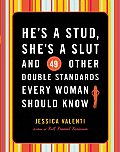
It is arguably the worst and best time to be a feminist. In the years since I first wrote
Full Frontal Feminism, we've seen a huge cultural shift in the way feminism is thought of along with the same old nonsense.
Decades after feminists fought for access to birth control, against sexual assault and rape culture, to have equal pay, and to be free from discrimination, we're still largely battling these same issues. But despite the political déjà vu, feminists do seem to be winning the culture wars: politicians that deride birth control use are widely mocked, the mainstream media that used to ignore or declare feminism dead is now on board, and the most culturally relevant artist in the world — Beyoncé — calls herself a feminist.
Perhaps best of all, since FFF was released, tens of thousands — maybe hundreds of thousands — of young women and men have started blogs, Tumblrs, Facebook pages, and organizations all dedicated to gender, racial, and class justice.
But let's not be fooled. At the same time that we're seeing this incredible progress, we continue to live in a country that is profoundly, terrifyingly misogynist.
In the last year we've seen three teenage girls who were raped commit suicide because of the awful shaming and harassment directed at them after they were attacked. We saw a defense attorney call an 11-year-old gang rape victim a "spider" luring men into her web. That happened the same year that a 49-year-old teacher in Montana got only 30 days in jail for raping his 14-year-old student because the judge said she was "older than her chronological age" and it "wasn't this forcible beat-up rape." These are just the cases we know about.
Abortion remains legal but only nominally. More abortion restrictions were enacted in the last two years than in the entire previous decade, 87 percent of counties have no abortion provider, and in states like Texas and Mississippi women's health and rights are already suffering acutely — especially when it comes to those who are most in need. Rich women will always be able to get the care they need; low-income women already cannot.
Despite the fact that we made birth control legal decades ago, there is somehow — bafflingly — an argument over whether or not contraception is part of women's health care or just a license for girls to get all slutty.
One in four women will experience domestic violence, and 40 percent of female murder victims are killed by a current or former partner. So we already know that too many women are not safe in their homes.
 Now, thanks to a study released last week, we also know that we're not safe in public either. The majority of American women have experienced harassment on the street, with nearly half being subject to aggressive street harassment like flashing or fondling.
Now, thanks to a study released last week, we also know that we're not safe in public either. The majority of American women have experienced harassment on the street, with nearly half being subject to aggressive street harassment like flashing or fondling.
In the last month alone, female students in one high school had their yearbook pictures Photoshopped so they would appear more "modest," a woman in Texas is suing after she was forced to give birth in solitary confinement and her child died, and a 16-year-old girl in Connecticut was stabbed to death by a classmate after she turned down his prom invitation because women turning down men's advances has become like a game of Russian roulette.
This was perhaps made clearest this past May when a young man in Santa Barbara went on a rampage, killing six people after writing a 140-page misogynist manifesto. The tragedy in Santa Barbara was a combination of many things — including gun culture, racism, and mental health issues. But it was also about misogyny — and the reason we know this is because he told us it was. The shooter told us in no uncertain terms why he made the decision to commit mass murder: because of women.
Because it was unacceptable — he called it "criminal," in fact — that women didn't want to sleep with him. Because he felt he was owed sex with women, because women aren't people but "vicious, stupid, cruel animals" and "a plague" and "spoiled, heartless, wicked bitches" who should not "have any rights in a civilized society."
But despite having this clear motive outlined by the killer himself, when feminists pointed out that this was a sexist crime, we were accused of being craven opportunists. This was a case of a lone madman, and arguing anything else was taking political advantage of an awful tragedy. But mental health and misogyny are not mutually exclusive.
As any feminist can tell you, the things this shooter wrote in his manifesto sound near-identical to the emails we get in our inboxes every day. So in the wake of this horrible crime, where a killer told us why he did it, I have to ask: If this isn't sexism, what is?
If we're completely unwilling to name misogyny when it's explicit and violent and obvious, how will we ever stop it when it's hidden and insidious?
Thankfully, I was far from the only person asking this question. After the shooting, tens of thousands of women took to Twitter sharing their experiences with violence, sexism, and harassment using the hashtag #YesAllWomen because while not all men are misogynist, all women have experienced misogyny.
 And we're sick of being told that it's in our heads, or that it's our fault, or — maybe worst of all — this is simply what life is like. Because it doesn't have to be.
And we're sick of being told that it's in our heads, or that it's our fault, or — maybe worst of all — this is simply what life is like. Because it doesn't have to be.
Every time we throw up our hands and expect that sexism is a given — that rape threats are just the cost of doing business as a female writer, or that sexual harassment is a natural male urge, or that it's reasonable for a young man to hate women for not sleeping with him, we're not just saying that we think violent sexism is inevitable. What we're really arguing is that we're unwilling to do anything about it. And I — along with every other feminist doing work today — don't accept that.
We don't believe that, in a country of people who are at their core good and caring and just, we can turn our heads away from the epidemic of hate on our doorstep. Part of the reason we're seeing this surge of cultural acceptance of feminism is that we're nearing a critical mass of people who recognize that sexism is a national sickness.
The Internet, and the decades of feminism before the Internet, and the work being done by young people today, have us very close to a tipping point for the movement. But we can't just talk about feminism when it's convenient, or put on blinders to gender injustices when the conversations are hard or require us to examine our own complicity in oppression. It's much more difficult to take action — and action is much more needed. Thankfully, we are taking action — whether online or in the streets, women and men who want to see gender justice in their lifetime have said enough. Now the only question is: Will you join them?